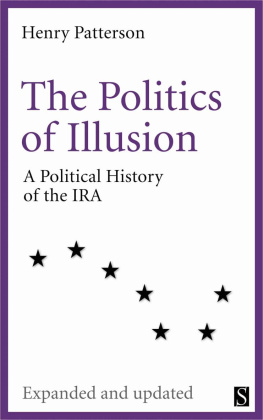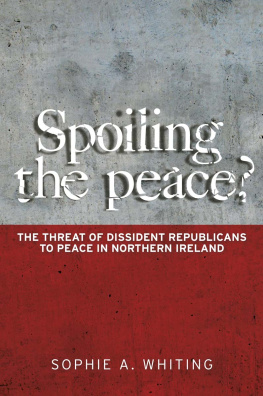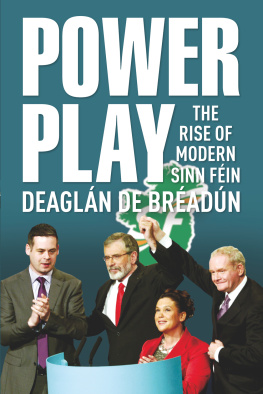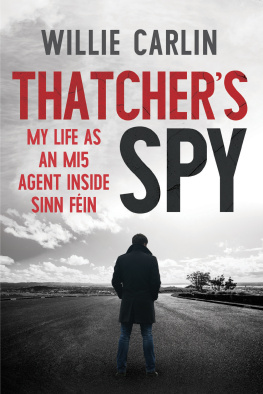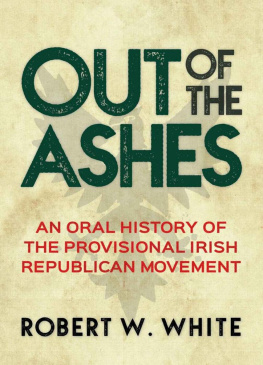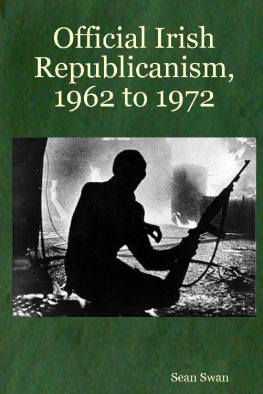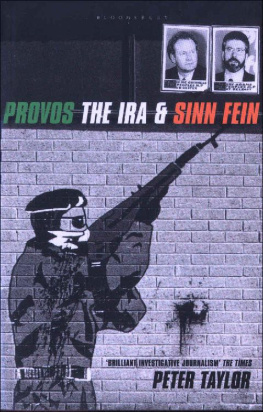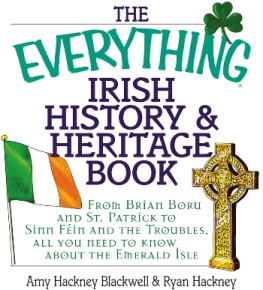PRAISE FOR THE POLITICS OF ILLUSION
Of immense value
Michael D. Higgins, The Irish Times
Subtle and authoritative
Fintan OToole, New York Review of Books
Good, even-handed history
The Guardian
The definitive history of the IRA
The World This Weekend, BBC Radio 4
Thought-provoking
Times Higher Education Supplement
A welcome addition to the historiography of the subject
Irish Historical Studies
An extremely timely book that will be an eye-opener for those who believe they understand Ireland and its problems
Library Journal
Henry Patterson is Emeritus Professor of Politics at the University of Ulster and the author of numerous books and articles on modern Irish history, including Ireland Since 1939: The Persistence of Conflict , Irelands Violent Frontier: The Border and Anglo-Irish Relations During the Troubles and Class Conflict and Sectarianism . With Paul Bew he is co-author of Sean Lemass and the Making of Modern Ireland and The British State and the Ulster Crisis , and with Paul Bew and Peter Gibbon of Northern Ireland 1921-2001: Political Forces and Social Classes .
The Politics of Illusion
A Political History of Sinn Fin and the IRA
Henry Patterson
Serif
London
This expanded and updated e-book edition first published 2015
by
Serif
47 Strahan Road
London E3 5DA
www.serifbooks.co.uk
Originally published, in a slightly different form, as The Politics of Illusion: Republicanism and Socialism in Modern Ireland by Hutchinson Radius in 1989 and, revised and updated, as The Politics of Illusion: A Political History of the IRA by Serif in 1997
Copyright Henry Patterson, 1989, 1997, 2015
The moral rights of the author have been asserted.
All rights reserved. No part of this publication may be reproduced, transmitted or stored in a retrieval system, in any form or by any means, without permission in writing from the publishers.
ISBN 978 1 909150 13 3
e-book produced by Will Dady
Cover design by Pentagram
Contents
For Sam, Alex and Annie
Acknowledgements
This book could not have been written without the assistance of those who agreed to be interviewed Gerry Adams, Jack Brady, Anthony Coughlan, Francie Donnelly, Jimmy Drumm, Sean Garland, Cathal Goulding, Eoghan Harris, Seamus Harrison, Roy Johnston, Seamus Lynch, Toms MacGiolla, Paddy Joe McClean, Dessie OHagan, Eamonn Smullen, Kevin Smyth and Jim Sullivan. I also received assistance from Mary McMahon. Eric Byrne and Ellen Hazelkorn gave me valuable criticism of what I had written on Official Republicanism in Dublin in the mid-1970s. Richard Dunphy gave me access to his major work on the history of Fianna Fil up to 1948. Anthony McIntyre gave a critical perspective on the peace process. Rogelio Alonso allowed me to see the transcript of his interview with Bernadette McAliskey. The book as a whole benefited from many conversations with Paul Bew, particularly on the nature of Sinn Fins modernisation since the mid-1970s. Carmel Roulstons work on the recent history of the Communist Party of Ireland was of great value, as were her detailed criticisms of the first draft of the book, which much improved it. Neil Belton was a source of support to the development of my work on Ireland and provided an intelligent and detailed editorial control to the first edition. Stephen Hayward and Will Dady at Serif were invaluable in their support and enthusiasm for this new and expanded e-book edition.
None of the people I have mentioned has any responsibility for the positions and interpretations of the author.
I would like to acknowledge the assistance of the staffs of the National Library of Ireland; the State Paper Office, Dublin Castle; the Linenhall Library, Belfast; the Library, University of Ulster at Jordanstown and the British Library at Colindale My research benefited from grants and study leave given by the Research Sub-Committee of the Faculty of Humanities of the University of Ulster and from the assistance of Jennifer Irwin and Joan Philipson
Henry Patterson
Belfast 2015
Introduction
Since the original version of this book was published in 1989, the collapse of the Soviet Union has radically transformed the international context in which Irish republicanism exists. Although the 1916 Rising predated the Bolshevik Revolution, it occurred in a period of rising working-class militancy in Ireland and Britain, and for most of its history the republican movement that developed out of the Rising had a complex and fraught relationship with working-class organisations and struggles. What distinguished The Politics of Illusion from histories of republicanism existing at the time was its focus on this relationship as key to understanding the movements ability periodically to resuscitate itself from the dead-end of a sterile, elitist militarism.
Until the Treaty split and Civil War, the revolutionary nationalist movement of Sinn Fin and the IRA, which had emerged in the aftermath of the Easter Rising of 1916, had strongly insisted on the trans-class and generally non-sectional nature of its project. In the wake of defeat, however, the opponents of the new order were forced to look to a range of hitherto neglected issues as a means of maintaining and expanding their support. The conditions of small farmers and landless labourers; low wages, unemployment and bad housing in Dublin and the larger towns; the fears and resentments of the Catholic minority in the newly established Unionist regime in Northern Ireland: all would represent opportunities for republicans. Yet they would be severely inhibited by the ideological legacy of nationalist purism and by the organisational weight of a secretive militarism which maintained a deep distrust of politics. In the inter-war period and again in the 1960s and 70s, in reaction to the defeats of what came to be seen as an apolitical and purely militarist republicanism, there emerged what this book will call social republicanism: an effort to rally the masses to the anti-imperialist struggle by taking up economic and social issues. This book is a study of social republicanism and its role in a number of crucial periods in modern Irish history. It will demonstrate the extreme difficulty that republicanism has experienced in managing the tensions that involvement in economic and social issues creates. These derive in part from the secretive nature of the tradition but also from the real danger that when such issues are taken seriously the central objective of republican struggle is put in question. From Peadar ODonnell in the 1930s to Gerry Adams in the 1980s, the attractions of social republicanism are clear, but so are its dangers for those committed to the legitimacy of armed struggle. Once republicanism takes up material issues land annuities and rural depopulation in the 1920s and 30s, or unemployment and poverty in the Catholic ghettos of the 1980s and 90s it risks marginalisation through state-sponsored reform. Thus another key factor bearing on the ability of the republican movement to maintain popular support is the states response. The decline of the IRA in the 1930s is largely explicable by the absorptive capacity of de Valeras political and social programme; and by the same token no analysis of the state of the IRA and Sinn Fin in the 1980s could avoid the issue of Thatcherism. There has been too much emphasis by historians on the republican tradition, taking us back through nineteenth-century examples of Fenianism and 1848 to Wolfe Tone and the United Irishmen in the 1790s; such an emphasis on an apparently unchanging tradition can blind us to the need to examine the very specific historical circumstances in which republicans operated, and which they were sometimes able to turn to their advantage. We need a more discontinuous, conjunctural analysis that breaks with the fatalism of traditional approaches, which, ironically, unconsciously mimic the self-serving certainties of the republican world view.
Next page
